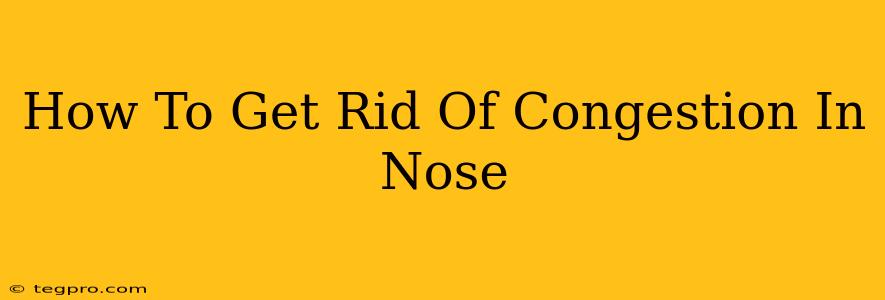A stuffy nose, or nasal congestion, is a common problem that can be incredibly uncomfortable. It can make it difficult to breathe, sleep, and even taste food properly. Fortunately, there are many ways to alleviate nasal congestion, from simple home remedies to medical treatments. This comprehensive guide will explore effective strategies to help you breathe easy again.
Understanding Nasal Congestion
Before we delve into solutions, it's important to understand what causes congestion. The most frequent culprits include:
- The Common Cold: Viral infections are a major cause, leading to inflammation and mucus production in the nasal passages.
- Allergies: Exposure to allergens like pollen, dust mites, or pet dander triggers an allergic reaction, resulting in swelling and congestion.
- Sinusitis: Inflammation of the sinuses can cause significant congestion and pain.
- The Flu: Influenza can cause severe congestion, often accompanied by fever and body aches.
- Environmental Irritants: Exposure to smoke, dust, or other irritants can irritate the nasal passages and lead to congestion.
Home Remedies for Nasal Congestion Relief
Many effective home remedies can provide quick relief from nasal congestion. These are often the first line of defense and can be highly effective:
1. Saline Nasal Rinse (Neti Pot)
A saline rinse helps to flush out irritants and mucus from your nasal passages. This is a highly effective method for allergy sufferers and those with post-nasal drip. Using a neti pot or a saline spray can significantly improve breathing.
2. Steam Inhalation
The warmth and moisture from steam can help to loosen mucus and ease congestion. Simply inhale steam from a bowl of hot water (be careful not to burn yourself) or take a hot shower. Adding essential oils like eucalyptus or peppermint can enhance the effect.
3. Hydration
Drinking plenty of fluids, especially water, helps thin the mucus, making it easier to drain. Staying well-hydrated is crucial for overall health and particularly beneficial when dealing with congestion.
4. Elevating Your Head
Sleeping with your head elevated on an extra pillow can help drain mucus and reduce congestion during the night. This simple adjustment can dramatically improve your sleep quality.
5. Over-the-Counter Medications
Various over-the-counter medications can provide relief. These include:
- Decongestants: These medications constrict blood vessels in the nasal passages, reducing swelling. However, prolonged use can lead to rebound congestion, so use them sparingly as directed.
- Saline Sprays: These are gentler than decongestants and can be used more frequently.
- Pain Relievers: Over-the-counter pain relievers like acetaminophen or ibuprofen can help relieve headaches and body aches associated with congestion.
When to See a Doctor
While many cases of nasal congestion resolve on their own, it's important to seek medical attention if:
- Congestion lasts for more than 10 days.
- You have a high fever (over 101°F or 38.3°C).
- You experience severe pain in your sinuses or face.
- You have difficulty breathing.
- You have green or yellow mucus.
- Your symptoms worsen.
A doctor can properly diagnose the underlying cause of your congestion and recommend appropriate treatment. They may prescribe stronger medications or suggest further investigations if necessary.
Preventing Nasal Congestion
While you can't always prevent congestion, taking steps to minimize your risk is important:
- Avoid known allergens: Identify and minimize your exposure to allergens.
- Wash your hands frequently: This helps prevent the spread of viruses.
- Quit smoking: Smoking irritates the nasal passages.
- Maintain good hygiene: Regular cleaning helps to reduce dust and irritants in your environment.
By understanding the causes of nasal congestion and utilizing effective home remedies and medical interventions when necessary, you can effectively manage your symptoms and breathe freely again. Remember to consult a healthcare professional if your symptoms are severe or persistent.

